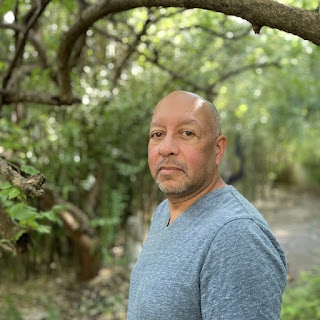Also No Fear: On Carl Phillips's "Cathedral"
CATHEDRAL
As a horse in harness to what, inevitably, must break it.
No torch; no lantern - and yet no hiddenness, now. No hiding.
Leaves flew through where the wind sent them flying.
(from Double Shadow, quoted in "Politics," My Trade is Mystery, Yale 2022)
____
What strikes me first: the poem's immediacy. "Cathedral" enters its subject without preamble, calls itself from the page directly to my imagination. Something has just happened, resulting in an absence of fear and hiding (along with something else, unnamed beyond “also”). Whatever it is involves breaking, darkness, and, paradoxically, exposure. Event or turn of thought, it happens off stage.
The poem articulates a precise moment of shift by pinning it to stasis, to a now in which a just then is implied. Not a lantern going out; just, no lantern. Not fear rushing out; simply no fear. And "no hiddenness, now."
The only physical movement is seen in the leaves, which have been sent flying. (When? I feel it as just a moment ago.) In this place of stillness, the action of the wind is ferocious: those leaves weren't just stirring, but flying. And not just flying; sent flying.
As if in their wake, the poem begins.
____
As if the force acting on the leaves has acted on the speaker, to remove fear, shadow, hiding.... As if inevitable.
It matters that the self is without fear, not fearless, a term that implies brave action.
____
I'm struck by the poem's voice, its sure-footedness (almost equine) as each line moves through phrase, through pause, towards its end, picks up again at each beginning.
There’s a whole catalogue of resonances this strikes for me: Kinds of transcendence I've read in Cavafy (in translation; it makes me want a Carl Phillips Cavafy!). Formal echoes of the Tang poets (also in translation): situation, recognition, observation. Those leaves, wind-blown not only through place, but through their own flying! And some of the mystery Alice Oswald captures in Nobody, in long lines built on simile; I'm tossed into essential strangeness and set down in the eternally happening moment.
____
I first encountered "Cathedral" in Phillips's essay "Politics," on the fraught subject of poetry and identity. Offering it as a closing argument, Phillips asks, "Is this a Black poem? A queer poem? Why or why not and who says." Read in this context, the poem exceeds such markers, soars into metaphysical realms.
It’s also the closing poem of the intense and intimate collection Double Shadow. In this context, the space of the book, where identity markers are more traceable, where things are at once themselves and other, seeming and shifting, corporeality is more pronounced, and the poem's giving-over feels ultimate.
Which "Cathedral" is richer? The one I’m reading as a stand-alone? Or the one I’m reading in its community of poems about being and the world, the body, love, the wilderness of existence? The poem performs a wonderful illusion, a trick of light: seen from one angle, it's a glossy leaf. Seen from another, it's veined and granular. Each version outshines its particulars.
____
So, a few more notes: Tolstoy's Prince Andrei under a lofty sky, in awe, waiting for his death (which doesn't come just then, only later). The young strongman tied up in Gwendolyn MacEwan's ravishing "Manzini: Escape Artist", the ropes transformed into his very body, the observer's awe "now there are no bonds except the flesh." (In "Cathedral," the stakes are raised; the body itself becomes the means of liberation.)
And (in a stretch, maybe too much, but it persists, turns up in more than one poem in this book), Donne of the Holy Sonnets, restless and testing, transcendent, marrying the corporeal to the holy.
____
Years ago in a classroom a student struggling to recall the word body arrived at charnel envelope. Phillips's way of transcendence - through the body - reminds me of this.
____
Carl Phillips's most recent book is Then the War: And Selected Poems 2007-2020, winner of the 2023 Pulitzer Prize for Poetry.
Image of Carl Phillips by Reston Allen.
"Cathedral" appears by permission of the author.
Visit carlphillipspoet.com
